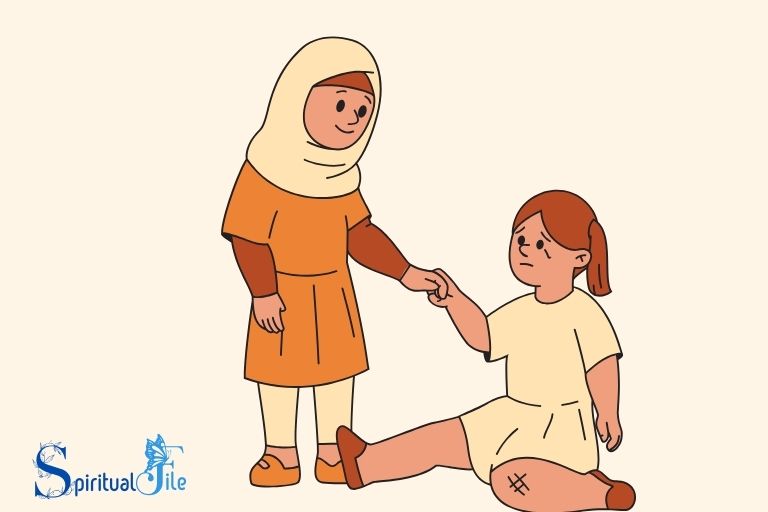Moral Spiritual Activities Examples: Values!
Moral spiritual activities are actions that inspire ethics, values, and spiritual growth in an individual. They can vary widely based on an individual’s personal beliefs and the cultural context.
Examples of moral spiritual activities may include meditation, prayer, participation in religious services, reading and reflecting on spiritual.

Key Takeaway
10 Moral and Spiritual Activities Examples
| Moral Spiritual Activities | Examples |
|---|---|
| Prayer | Morning prayers, Evening prayers, Mealtime prayers |
| Meditation | Mindfulness meditation, Spiritual retreats, Zen meditation |
| Study of Sacred Texts | Bible study, Quran reading, Torah study |
| Charitable Work | Donating to the needy, Volunteer services at shelters, Helping the elderly |
| Worship Services | Sunday mass, Sabbath services, Jumah prayer |
| Fasting | Ramadan fasting, Lent fasting, Yom Kippur fasting |
| Pilgrimage | Hajj, Visiting the Vatican, Journey to Jerusalem |
| Repentance | Confession, Teshuvah, Seeking forgiveness |
| Celebration of Festivals | Christmas, Diwali, Passover |
| Moral Instruction | Sunday school, Ethics class, Teaching of moral values |
Understanding Moral Spiritual Activities
Moral spiritual activities refer to a range of practices deeply rooted in one’s ethical and spiritual beliefs. They play a vital role in fostering values, inner peace, and a sense of purpose while serving as the cornerstone of moral and spiritual development.
Defining Moral Spiritual Activities:
Moral spiritual activities encompass actions such as meditation, prayer, mindfulness, charity, self-reflection, and religious or philosophical rituals. They all focus on ethics, values, and spiritual connectedness.
Fostering Values:
Engaging in moral spiritual activities helps individuals cultivate core values like compassion, empathy, forgiveness, and integrity. These practices encourage people to internalize these virtues, making morally sound decisions and treating others with respect.
Inner Peace:
Regular practice of activities like meditation and mindfulness leads to inner peace. These practices quiet the mind, reduce stress, and provide a sanctuary where individuals connect with their inner selves, promoting mental and emotional well-being.
Sense of Purpose:
Moral spiritual activities aid in discovering a profound sense of purpose. By aligning actions with values and beliefs, individuals reflect on life’s meaning, their role in the world, and their contribution to the greater good, finding direction and motivation in the process.
Connection to Moral and Spiritual Development:
Integral to moral and spiritual development, these activities serve as a growth framework, evolving one’s moral compass and spiritual understanding.
Over time, individuals become more attuned to their ethical responsibilities and their connection to the universe or higher power, based on their beliefs.
These activities promote self-awareness, encouraging personal growth by challenging individuals to become better versions of themselves, both ethically and spiritually.
As a result, people experience a deepening of faith, a heightened sense of interconnectedness with others, and a greater commitment to ethical living.
Examples Of Moral Spiritual Activities
Explore a range of moral spiritual activities exemplifying ethical values and beliefs. Engage in acts of kindness, practice forgiveness, promote empathy, and cultivate gratitude for a well-rounded spiritual and moral growth.
Practicing Meditation And Mindfulness
Meditation and mindfulness are powerful practices that promote moral and spiritual growth.
Here are some examples of how these activities can contribute to your overall well-being:
- Increased self-awareness: Through meditation and mindfulness, you can develop a deeper understanding of your thoughts and emotions. This heightened self-awareness allows you to make more conscious decisions and act in accordance with your values.
- Stress reduction: In today’s fast-paced world, stress can take a toll on our mental and physical health. Engaging in regular meditation and mindfulness helps to calm the mind, relax the body, and alleviate stress.
- Enhanced empathy and compassion: By practicing meditation and mindfulness, you cultivate qualities such as empathy and compassion towards yourself and others. This enables you to respond to situations with kindness and understanding.
- Improved focus and concentration: The ability to stay focused and concentrate on tasks is essential for personal and professional growth. Meditation and mindfulness techniques help train the mind to stay present and concentrate on the task at hand.
- Heightened spiritual connection: For many individuals, meditation and mindfulness serve as a gateway to deeper spiritual experiences. These practices can help you connect with your inner self and explore the spiritual dimensions of life.
Engaging In Acts Of Kindness And Generosity
Acts of kindness and generosity have the power to uplift both the giver and the receiver.
Here are some examples of how you can spread positivity through these actions:
Random acts of kindness: Doing something nice for a stranger without expecting anything in return can have a profound impact on both parties.
It can be as simple as paying for someone’s coffee, offering assistance to someone in need, or leaving a kind note for a coworker.
Volunteering your time: Giving your time and energy to help others is a fulfilling way to spread kindness and make a difference. Consider volunteering at a local shelter, hospital, or community center to contribute towards a greater cause.
Donating to charitable organizations: Contributing to charitable organizations that align with your values allows you to support causes that are important to you. Whether it’s donating money, goods, or services, every little bit helps make a positive impact.
Being there for loved ones: Kindness and generosity begin at home. Being there for your friends and family during both joyful and challenging times fosters stronger relationships and promotes a sense of belonging.
Sharing knowledge and skills: One of the most valuable ways to be kind and generous is by sharing your expertise with others. Whether it’s teaching a skill, offering mentorship, or providing guidance, your knowledge can empower others to grow and succeed.
Participating In Community Service Projects
Getting actively involved in community service projects not only benefits your local community but also enhances your moral and spiritual growth.
Here are some examples of community service activities that you can participate in:
- Environmental clean-ups: Taking part in initiatives to clean up parks, beaches, or other natural environments helps preserve the planet and promotes a sense of responsibility towards the environment.
- Supporting local schools: Volunteering at schools can have a significant impact on students’ lives. You can assist with tutoring, mentoring, or organizing extracurricular activities to contribute to their overall development.
- Organizing food drives: Hunger and food insecurity are pervasive issues in many communities. Organizing food drives or volunteering at local food banks can help ensure that everyone has access to nutritious meals.
- Assisting the elderly: The elderly often require assistance with everyday tasks. Offering your time to help them with grocery shopping, household chores, or simply providing companionship can make a huge difference in their lives.
- Raising awareness for important causes: Participating in events or campaigns that aim to raise awareness for social issues, such as poverty, inequality, or mental health, can contribute to positive change within society.
Engaging in moral spiritual activities such as practicing meditation and mindfulness, performing acts of kindness and generosity, participating in community service projects, and volunteering for charitable organizations can be transformative experiences.
These activities not only contribute to personal growth but also create a positive impact on the world around us. Start incorporating these practices into your life and witness the positive changes they bring.
Categories of Moral Spiritual Activities
Certainly! Moral spiritual activities can be categorized into various distinct categories based on their nature and purpose.
Here are some categories of moral spiritual activities:
Meditation and Mindfulness:
- Meditation involves practices that focus on quieting the mind, enhancing self-awareness, and connecting with inner peace or higher consciousness.
- Mindfulness exercises encourage being present in the moment, observing thoughts and emotions without judgment.
Acts of Kindness and Compassion:
- Acts of kindness involve selflessly helping others, whether through small gestures or significant actions.
- Practicing compassion means showing empathy and understanding towards others’ suffering and actively working to alleviate it.
Self-Reflection and Contemplation:
- Self-reflection involves introspection and examining one’s values, beliefs, and actions to foster personal growth and ethical development.
- Contemplation includes deep thinking and pondering life’s big questions, such as the meaning of existence and one’s purpose.
Community Involvement and Service:
- Community involvement entails actively participating in social or community-based initiatives, such as volunteering, to contribute to the greater good.
- Service to others can be a powerful way to connect with one’s spiritual values and promote a sense of interconnectedness.
Prayer and Worship:
- Prayer and worship activities are often associated with organized religions and involve seeking connection with a higher power, expressing gratitude, and seeking guidance.
Yoga and Physical Practices:
- Yoga combines physical postures, breath control, and meditation techniques to enhance physical and spiritual well-being.
- Other physical practices like tai chi or qigong can also be used for spiritual growth and balance.
Studying Sacred Texts and Philosophy:
- Engaging with sacred texts, religious scriptures, or philosophical literature can deepen one’s understanding of moral and spiritual principles.
- Studying these texts can provide guidance and inspiration for ethical living.
Nature and Eco-Spirituality:
- Connecting with nature and the environment can be a spiritual experience for some, fostering a sense of awe, responsibility, and reverence for the natural world.
Artistic and Creative Expression:
- Creative activities, such as art, music, and writing, can be used as a means of self-expression and exploration of spiritual themes.
- Forgiveness and Healing:
- Practicing forgiveness, both of oneself and others, can be a spiritually transformative process that promotes emotional healing and growth.
These categories are not mutually exclusive, and individuals may engage in a combination of these activities to nurture their moral and spiritual well-being.
The choice of activities often depends on personal beliefs, values, and goals in the pursuit of a more meaningful and spiritually fulfilling life.
Conclusion
Engaging in moral and spiritual activities can profoundly impact our lives, fostering a sense of purpose and fulfillment. Whether through acts of kindness, gratitude, or meditation, these practices benefit both ourselves and those around us.
These activities cultivate compassion, empathy, and understanding, promoting harmony in relationships and communities. They are a personal journey connecting us with our inner selves and surroundings, enabling us to lead more meaningful lives and make a positive impact.
Embrace activities like volunteering, forgiveness, or connecting with nature, striving to be your best self.






